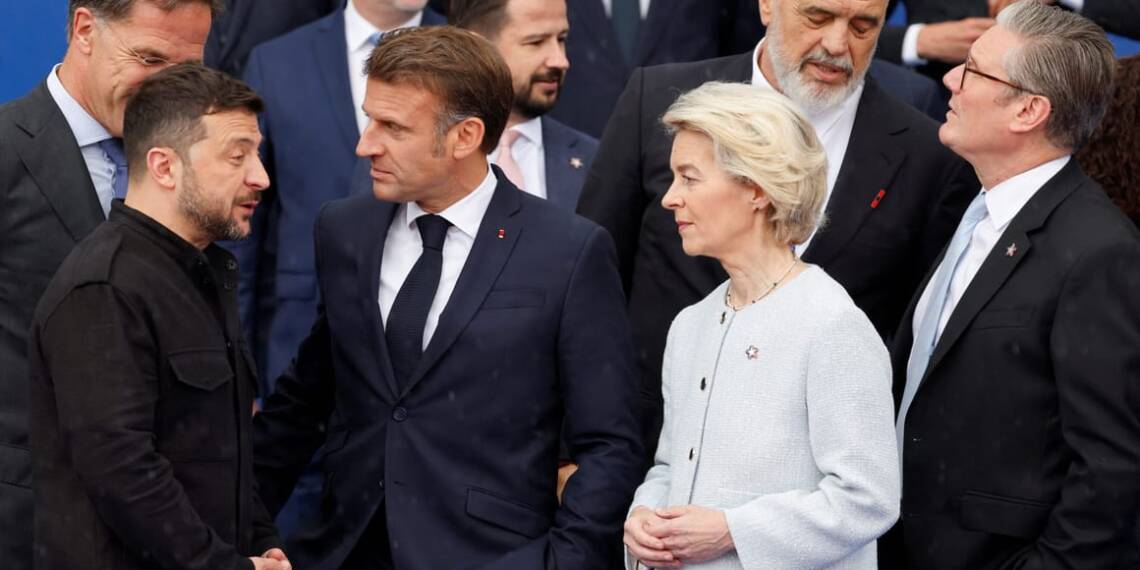In a significant escalation of its economic stance against Moscow, the European Union is preparing to impose new sanctions targeting Russia’s energy infrastructure, including a full transaction ban on the Nord Stream pipelines and a reduction in the oil price cap on Russian crude exports.
The proposed measures signal a renewed determination in Brussels to tighten the economic pressure on the Kremlin amid ongoing geopolitical tensions and continued Russian military activity in Ukraine.
EC President Ursula von der Leyen announced on Tuesday. “No EU operator will be able to engage directly or indirectly in any transaction regarding the Nord Stream pipelines. There is no return to the past,” she stated.
The commission has also suggested expanding the EU sanctions list to include additional Russian banks and implementing a “complete transaction ban” alongside existing restrictions on the use of the SWIFT financial messaging system. The restrictions would also apply to banks in third countries that “finance trade to Russia in circumvention of sanctions,” according to the EC president.
According to EU officials familiar with the matter, the sanctions package would include:
A complete transaction ban on Nord Stream 1 and Nord Stream 2, the major gas pipelines running under the Baltic Sea. While both pipelines have been largely inactive since the onset of the war — with Nord Stream 2 never becoming operational and Nord Stream 1 damaged in 2022 — the legal move would effectively formalize their exclusion from the European energy market.
A revision of the G7-led oil price cap mechanism, which currently limits the sale price of Russian oil transported by Western firms and insurers to $60 per barrel. Brussels is reportedly considering lowering the cap to tighten restrictions on Russia’s oil revenue, although exact figures are yet to be finalized.
The EU’s 14th sanctions package, which includes these measures, is part of a broader effort to close loopholes, limit circumvention by third countries, and reduce Russia’s ability to finance its war effort.
Strategic Impact
While symbolic in part — especially given the current inactivity of Nord Stream — the transaction ban would send a strong message about the EU’s long-term decoupling from Russian energy. Energy analysts say the move may also complicate any future attempts to revive gas imports from Russia, even if political conditions change.
“Even if the infrastructure could be repaired, this would put a legal padlock on any normalization,” said a senior European diplomat.
Meanwhile, the proposed adjustment to the oil price cap could prove more immediately impactful. Despite enforcement challenges, the cap has played a role in curbing Russian oil revenues, though Moscow has adapted by increasing sales to countries like India and China using a “shadow fleet” of tankers.
Internal Debate
The sanctions proposal still requires unanimous approval from all 27 EU member states, and internal divisions could slow the process. Countries with historically closer energy ties to Russia or more cautious economic outlooks may resist some of the tougher provisions.
However, momentum appears to be building among key member states, especially following recent intelligence assessments and renewed calls for stricter enforcement from Eastern European governments.
Negotiations are expected to continue in Brussels over the coming weeks, with a final vote potentially scheduled before the EU’s summer recess.
If passed, the measures would represent one of the most comprehensive energy-focused sanctions packages to date and reinforce the EU’s commitment to a long-term pivot away from Russian fossil fuels.
Meanwhile Moscow has sharply condemned the proposed EU measures, calling them “hostile and illegal under international law.” Kremlin spokesperson Dmitry Peskov said on Wednesday that any expansion of sanctions against Russian energy infrastructure would be met with “appropriate countermeasures,” without specifying what form they might take.
The EU continues to act against its own energy security and economic interests,” Peskov stated. “Nord Stream was once a symbol of cooperation — now it is being weaponized for political gain.”
Russia’s Foreign Ministry also issued a statement accusing Brussels of acting under pressure from Washington and pursuing a “self-destructive agenda.” Officials warned that further interference with Russian energy exports, including manipulations of the oil price cap, would have global market consequences.
In parallel, Russian energy companies, including Gazprom, have begun reviewing legal options and may seek compensation through international arbitration as Putin will now alao look for alternate partners and delink from a European partnership that is not yielding any great benefit for Russia.







